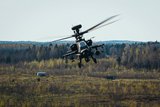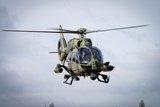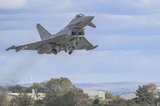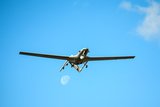Netherlands receives first MQ-9A Reaper UAS
The Dutch military placed its $123 million order for four MQ-9A Reapers in 2018. (Photo: RNLAF)
The Reaper will be used for training purposes for the first 306 Squadron personnel.
Following a cancelled MALE UAV project in 2007, the Dutch MoD revealed its intention to acquire four MQ-9A Reapers from GA-ASI in 2013, choosing the drone over the Heron TP from Israel Aerospace Industries (IAI).
The Dutch military placed its $123 million order in 2018, with deliveries scheduled for 2021. This delivery date was not met, with the drones instead being delivered to the RNLAF throughout 2022.
The first Dutch copy rolled out of the factory of General Atomics Aeronautical Systems (GA-ASI) in July 2021 at Poway, US. The RNLAF received it in February 2022 but it was shipped to the Caribbean for testing.
The other three MQ-9As are still based at Hato airport at Curaçao in the Caribbean. These three will be ‘operated’ via a Ground Control Station (GSC) at Leeuwarden air base soon.
The Reapers are not yet armed, but in May this year, the State Secretary of Defence informed the Dutch House of Representatives that it would purchase ammunition for the MQ-9As. The ammunition is expected to be fully deployable in 2028.
Related Programmes in Defence Insight
MQ-9A Reaper (First Batch) [Netherlands]
Related Equipment in Defence Insight
More from Air Warfare
-
![Airbus Helicopters sees defence portfolio’s “strong momentum” continue into 2026]()
Airbus Helicopters sees defence portfolio’s “strong momentum” continue into 2026
The aerospace company’s 2025 performance figures revealed significant orders from various European armed forces and a boost in demand for its uncrewed offerings.
-
![UK MoD awards investment for full production of RAF’s Eurofighter Typhoon radar upgrade]()
UK MoD awards investment for full production of RAF’s Eurofighter Typhoon radar upgrade
The contract deal will enable the production and integration of the Eurofighter Typhoon’s new Eurofighter Common Radar System Mk 2 on part of the UK Royal Air Force’s fleet.
-
![Bayraktar TB2: The $4.11 billion market success of a cost-effective MALE UAV]()
Bayraktar TB2: The $4.11 billion market success of a cost-effective MALE UAV
The success of the Bayraktar TB2 stems from it fulfilling a niche of providing reasonable capabilities at a low cost, leading to its acquisition by more than 30 countries including many in Africa; but there are reasons to be cautious about its potential future prospects.





















